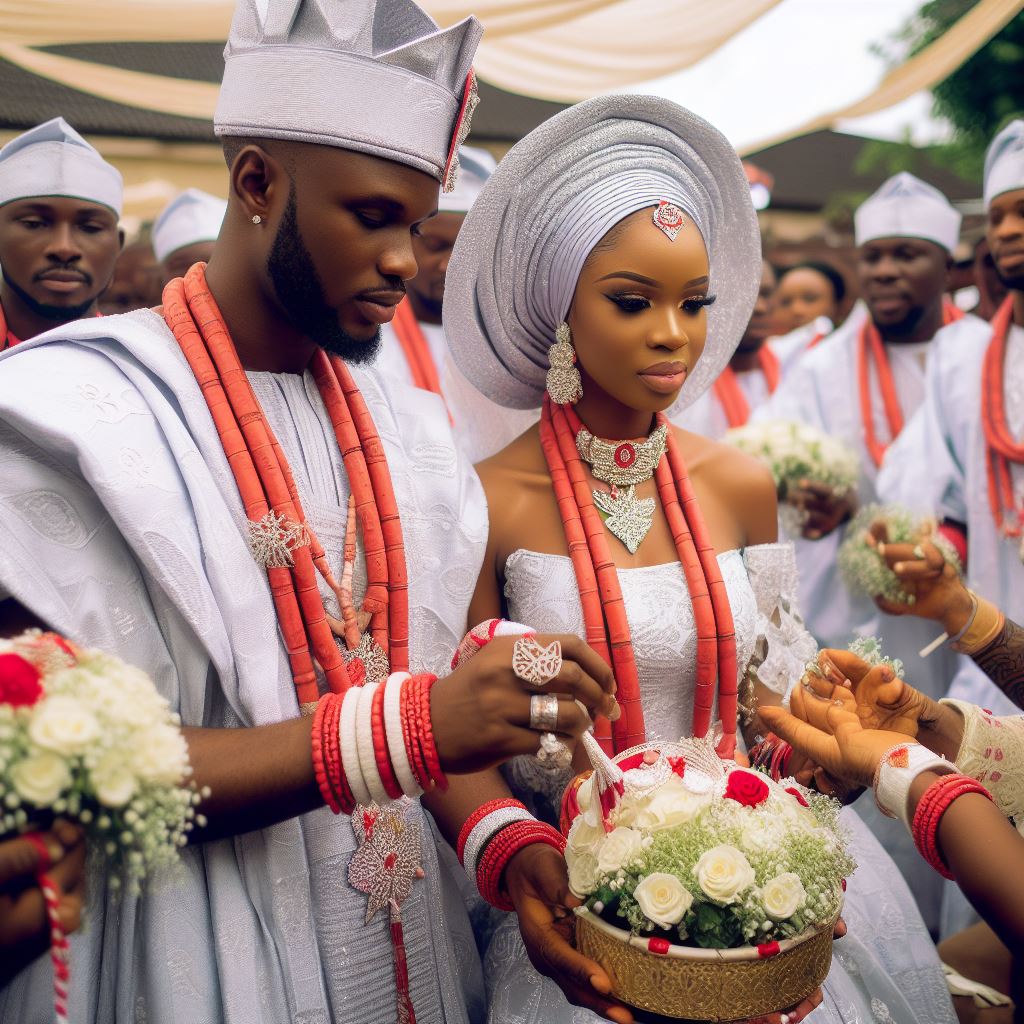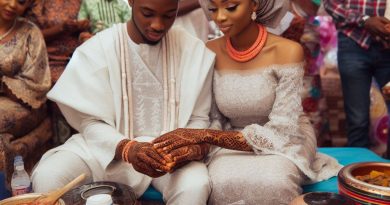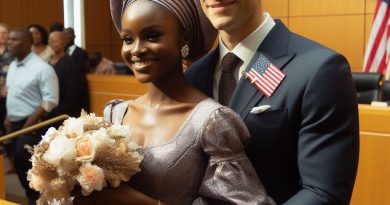Inter-tribal Marriages in Nigeria: Stories of Unity
Last Updated on January 28, 2024
Introduction
Inter-tribal marriages in Nigeria are a vibrant tapestry of love and cultural diversity, blending the rich traditions of various ethnic groups.
In a nation with over 250 distinct ethnicities, these unions symbolize unity in diversity.
This section introduces the topic, highlighting the significance of exploring stories of unity within these marriages.
- Diverse Nation, Diverse Love: Nigeria’s multi-ethnic landscape fosters unique relationships, bridging cultural divides.
- Cultural Richness Unveiled: Inter-tribal marriages showcase the beauty of Nigerian cultures interwoven with love.
- The Unifying Force of Love: Despite ethnic disparities, love conquers all, fostering unity and harmony.
- Importance of These Stories: Exploring tales of unity in inter-tribal marriages inspires cohesion and understanding.
- A Journey Through Love and Culture: This section unravels the tales of these remarkable unions, highlighting love’s ability to transcend boundaries.
- Celebrating Unity: Through these stories, we honor the harmony, tolerance, and respect that define these inter-tribal marriages.
In this section, we delve into heartwarming accounts that exemplify love’s power to unite diverse ethnicities in Nigeria.
Historical background of inter-tribal marriages in Nigeria
Inter-tribal marriages in Nigeria reflect its rich cultural diversity and have faced historical resistance.
Challenges have included:
- Stigmatization
- Discrimination
- Fear of ancestral spirits’ wrath
Yet, evolving attitudes and government initiatives, like the National Youth Service Corps, promote unity.
This change leads to greater acceptance of inter-tribal marriages.
Modern couples prioritize love, compatibility, and shared values, bridging cultural boundaries.
The younger generation, especially, challenges traditional barriers and promotes unity and cultural exchange.
While challenges persist in remote or conservative areas, growing acceptance of inter-tribal marriages fosters unity, tolerance, and cultural harmony in Nigeria.
Couples serve as ambassadors of unity, breaking stereotypes, and promoting a more inclusive society.
Encouragingly, these marriages highlight Nigeria’s potential for unity and a united future.
Read: Pros and Cons of Having a Marriage Contract in Nigeria
Changing perspectives and acceptance of inter-tribal marriages
In the dynamic and ever-evolving society of Nigeria, the perspective and acceptance of inter-tribal marriages have undergone significant changes in recent years.
This is attributed to various factors that have influenced the mindset and attitudes of individuals and communities towards this once-perceived taboo.
Influence of urbanization and globalization
- As Nigeria continues to urbanize at a rapid pace, cities have become melting pots of different tribes and cultures.
- Urban centers facilitate interactions between people from diverse backgrounds, creating opportunities for cross-cultural relationships to develop.
- The exposure to different cultures through globalization has broadened the horizons of individuals and challenged preconceived notions.
- This exposure has played a pivotal role in breaking down barriers and fostering acceptance of inter-tribal unions.
Educated individuals leading the change
- The rise in education levels has empowered individuals to question traditional norms and embrace modern values.
- Highly educated individuals, in particular, are more likely to challenge tribal boundaries and opt for inter-tribal marriages.
- Education equips people with critical thinking skills, enabling them to overlook tribal differences and focus on shared values.
- These educated individuals serve as catalysts for change within their families and communities, promoting the acceptance of inter-tribal unions.
Increasing openness and support from families and communities
- Over time, families and communities in Nigeria have become more open-minded and supportive of inter-tribal marriages.
- Many families now prioritize the happiness and well-being of their children over tribal affiliations.
- They recognize the benefits of inter-tribal unions, such as fostering unity, cultural exchange, and breaking down stereotypes.
- Communities, too, are gradually embracing the idea of inter-tribal marriages, realizing that it strengthens social cohesion.
These collective changes in perspective and acceptance have significantly shifted the landscape of inter-tribal marriages in Nigeria.
The once frowned upon unions are now celebrated and seen as a symbol of unity and progress.
While there may still be pockets of resistance and individuals who cling to outdated beliefs, the overall trend is towards a more inclusive and diverse society.
It is important to note that inter-tribal marriages not only bridge cultural divides but also contribute to the country’s socio-economic development.
As inter-tribal unions become more prevalent, a richer tapestry of culture, language, and traditions emerge, fueling creativity and innovation.
Furthermore, inter-tribal marriages foster a sense of national identity and solidarity, promoting peace and harmony among different ethnic groups in Nigeria.
In short, the changing perspectives and acceptance of inter-tribal marriages in Nigeria can be attributed to the influence of urbanization and globalization, educated individuals leading the change, and increasing openness and support from families and communities.
This societal shift represents a significant step towards a more united and harmonious Nigeria, where love knows no tribal boundaries.
Read: Gifts & Wishes: Complete Guide to Anniversaries in Nigeria

Success stories of inter-tribal marriages in Nigeria
Inter-tribal marriages in Nigeria are not uncommon, and many couples have inspiring success stories to share.
These stories are a testament to the power of love and understanding, showcasing how two individuals from different tribes can come together and build a strong and lasting relationship.
Personal anecdotes of couples who overcame challenges
One such success story is the tale of Chinedu and Amina, a couple from different tribes who faced opposition from their families initially.
Chinedu, an Igbo man, and Amina, a Hausa woman, fell in love during their college years.
Despite cultural and religious differences, they decided to pursue their relationship.
Chinedu and Amina faced significant challenges as they navigated the complexities of their inter-tribal marriage.
They had to confront stereotypes, prejudices, and societal expectations.
However, their love and commitment to each other helped them overcome these obstacles.
Through open communication and mutual respect, Chinedu and Amina were able to address their families’ concerns and fears.
They emphasized the shared values and dreams they had for their future together.
Eventually, their families began to see the strength of their relationship and offered their support.
Demonstrating unity, love, and understanding across cultures
Inter-tribal marriages like Chinedu and Amina’s showcase the potential for unity, love, and understanding across cultures.
These couples serve as living proof that love knows no boundaries and can transcend tribal differences.
Their ability to embrace each other’s cultures and traditions has created a harmonious blend of customs.
For instance, Chinedu and Amina celebrate both Igbo and Hausa festivals, ensuring that their children grow up with an appreciation for both heritages.
This fusion of cultures not only enriches their lives but also fosters a sense of unity and diversity within their family.
Furthermore, these success stories inspire other couples to believe in the power of love and to break free from the shackles of tribal divisions.
They encourage embracing differences and finding common ground, reinforcing the idea that inter-tribal marriages can be a source of strength and harmony in Nigeria.
Importance of mutual respect and compromise
A critical aspect of successful inter-tribal marriages is the cultivation of mutual respect and compromise.
Couples must be willing to understand and accept each other’s cultural backgrounds without judgment or bias.
For example, Adamu and Funke, a couple from different tribes, have built a strong foundation based on mutual respect.
They actively seek to learn about each other’s traditions and participate in important cultural events with an open mind.
This willingness to compromise has strengthened their bond and created a shared sense of identity.
Moreover, successful inter-tribal marriages often serve as bridges between communities, promoting tolerance and understanding among different tribes.
They challenge stereotypes and encourage a broader acceptance of diverse cultures within Nigerian society.
In fact, inter-tribal marriages have the potential to bring unity, love, and understanding to Nigeria.
Stories of couples who have overcome challenges, demonstrated respect and compromise, and celebrated their diverse backgrounds serve as inspiration for others.
These success stories not only highlight the beauty of cross-cultural unions but also emphasize the importance of embracing differences and fostering harmonious relationships in our diverse society.
Read: Guide to Nigeria’s Marriage Registry Procedures: Step by Step
You Might Also Like: Contemporary Nigerian Authors on Love & Commitment
Benefits of inter-tribal marriages
Inter-tribal marriages in Nigeria have numerous benefits that contribute to national unity and integration.
Contribution to national unity and integration
- Inter-tribal marriages serve as a powerful symbol of unity in a country known for its diversity.
- When individuals from different tribes come together through marriage, it breaks down barriers and fosters a sense of belonging to a larger Nigerian identity.
- These marriages promote a sense of shared goals and values, leading to a more cohesive and integrated society.
Encouraging cultural exchange and appreciation
- Inter-tribal marriages promote the exchange of cultural practices, traditions, and languages.
- Through marriage, couples have the opportunity to learn about and appreciate each other’s customs, creating a rich blend of cultural experiences.
- Children born from inter-tribal marriages grow up with a unique understanding and appreciation of diverse cultures.
Promoting harmony and understanding among different tribes
- Inter-tribal marriages help to diminish stereotypes and prejudices between tribes.
- By building personal connections between individuals from different tribes, these marriages encourage empathy and mutual understanding.
- They provide a platform for open communication, negotiation, and compromise, fostering peaceful coexistence.
In essence, inter-tribal marriages in Nigeria play a significant role in promoting national unity and integration.
They encourage cultural exchange and appreciation, enriching the society with diverse traditions.
Furthermore, these marriages foster harmony and understanding among different tribes, breaking down barriers and prejudices.
Nigeria is a country that thrives on its diversity, and inter-tribal marriages contribute to the strength and resilience of the nation.
Read: Getting Legal Help: Navigating Marriage Contracts in Nigeria
Challenges still prevalent in inter-tribal marriages
Challenges in inter-tribal marriages persist, including stereotypes and cultural clashes.
Strategies for addressing these challenges and promoting understanding:
- Lingering stereotypes and prejudices create tensions and misunderstandings.
- Clash of cultural practices and values require compromise and respect for traditions.
- Education and awareness can debunk misconceptions and foster empathy.
- Open communication and compromise bridge cultural gaps, fostering mutual respect.
- Seek support from family and communities to create a supportive environment.
- Actively engage in promoting unity and understanding beyond personal relationships.
In general, despite challenges, inter-tribal marriages can contribute to unity in Nigeria by addressing and overcoming obstacles.
Learn More: Role of the Registrar in Nigerian Statutory Marriages: An Overview
Conclusion
Discussing inter-tribal marriages is imperative for fostering unity in Nigeria.
We must encourage more individuals to embrace diversity and unity in their relationships.
By ending on a positive note, we emphasize the power of love to bridge cultural gaps.
Together, we can create a Nigeria where inter-tribal marriages are celebrated and cherished.
Let us strive for a future where our differences strengthen our bonds rather than tear us apart.
Remember, love knows no boundaries, and when we unite, there is no limit to what we can achieve.


